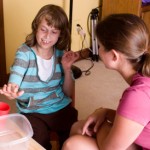
In her debut blog, Melanie Luximon writes with Nina Higson-Sweeney to summarise a recent qualitative study exploring the benefits of involving young people in mental health research.
[read the full story...]
In her debut blog, Melanie Luximon writes with Nina Higson-Sweeney to summarise a recent qualitative study exploring the benefits of involving young people in mental health research.
[read the full story...]
In his debut blog, Kris Deering summarises a paper which looks at the evidence gaps and research priorities for early intervention in psychosis.
[read the full story...]
In her debut blog, Isabela Troya reviews a review of reviews (get your head around that!), which reported on how patients and the public have been involved in realist reviews and the impact that this involvement has had.
[read the full story...]
Anjuli Kaul explores a recent systematic review on the identification and treatment of mental health and substance misuse problems in sexual assault services.
[read the full story...]
The past few years has seen the publication of a number of national reports which have highlighted the often poor response to people with learning disabilities by health services, (‘Death by Indifference’, ‘Healthcare for all’ ‘Six Lives’ investigation) which led to a number of key recommendations for improvement, including the need for reasonable adjustments in [read the full story…]

As you know, here at Elf towers our aim is to bring you the published evidence in supporting people with learning disabilities, but occasionally we will also draw your attention to practice tools and resources that we think might help improving people’s lives. Today, we wanted to draw your attention to some materials produced in Essex [read the full story…]

We have posted a number of times about the response of health services to the needs of people with learning disabbilites and recent reports have focused on the experience of people using general hospitals (see for example Mencap 74 Deaths and counting) One response to this concern has been the development of the Learning Disability [read the full story…]

The organisation of mental health services for people with learning disabilities, particularly issues relating to inpatient care remains an important area for research. This review of the literature set out to identify recent findings. The review found that people with learning disabilities appeared to be admitted with more severe problems and also received more interventions [read the full story…]

This Canadian review set out to update guidelines related to primary care of people with learning disabilities. The terms developmental disabilities is used in Canada but is equivalent to the use of the term learning disabilities in the UK. Estimates of the prevalence of learning disabilities in Canada vary from 1% to 3% of Canadians. [read the full story…]

This Scottish study set out to review the evidence on support for spirituality for people with learning disabilities, an area the author describes as relevant but neglected as a topic and rarely addressed by healthcare professionals. The author met with a wide range of stakeholders including people with disabilities, local faith groups, service managers, parents [read the full story…]